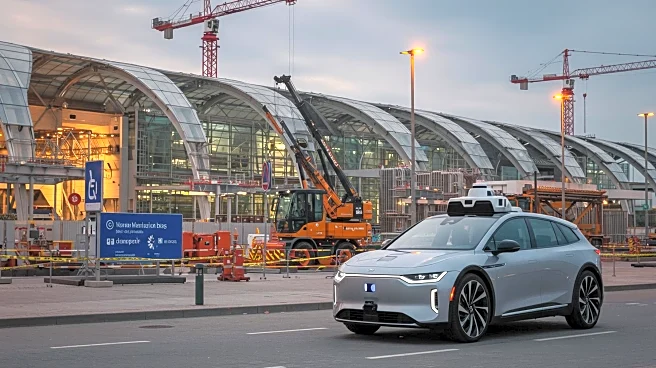What is the story about?
What's Happening?
Riyadh's Deputy Emir, Prince Mohammed bin Abdulrahman, recently tested a self-driving car and inspected ongoing development projects at King Khalid International Airport. Accompanied by Transport Minister Saleh Al-Jasser, the Deputy Emir's visit highlighted the Kingdom's first rollout of self-driving vehicle services in the capital. The inspection included a review of the operations control center, which utilizes advanced systems and artificial intelligence to enhance passenger experiences. The airport's expansion, particularly at Terminals 1 and 2, aims to increase capacity by 14 million passengers annually, raising the total capacity to approximately 56 million passengers per year. These developments are part of a broader strategy to position Riyadh as a global logistics hub.
Why It's Important?
The expansion of King Khalid International Airport is a significant step in reinforcing Riyadh's status as a major transport and logistics hub. By increasing passenger capacity and integrating advanced technologies, the airport aims to improve efficiency and traveler experiences. This development is expected to enhance Riyadh's economic footprint in cargo and logistics operations, bolstering its role as an international center for travel, transport, tourism, and trade. The project aligns with Saudi Arabia's Vision 2030, which seeks to diversify the economy and reduce dependency on oil revenues. The airport's expansion is also linked to the future King Salman International Airport, projected to become one of the largest aviation projects globally.
What's Next?
The ongoing airport expansions serve as a precursor to the King Salman International Airport project, which is expected to have an initial capacity exceeding 100 million passengers annually by 2030, growing to 185 million by 2050. As these projects progress, they are likely to attract increased international investment and partnerships, further solidifying Riyadh's position in the global aviation industry. The successful implementation of self-driving vehicle services could also pave the way for broader adoption of autonomous technologies in Saudi Arabia's transport sector.
















